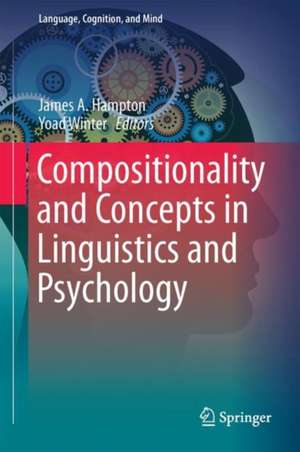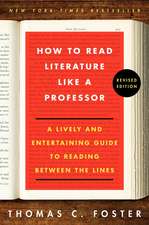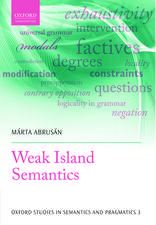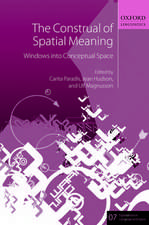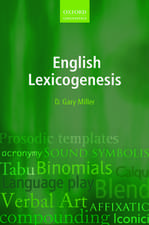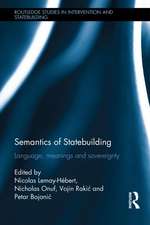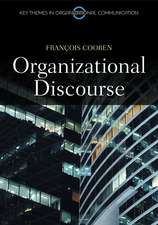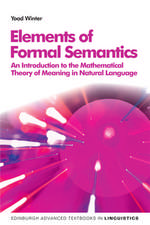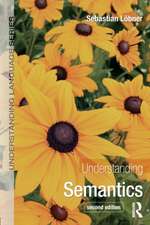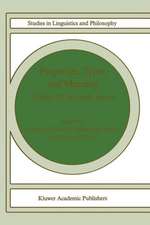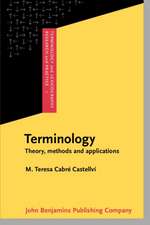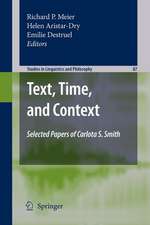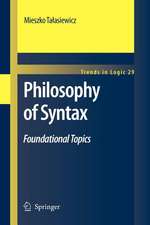Compositionality and Concepts in Linguistics and Psychology: Language, Cognition, and Mind, cartea 3
Editat de James A. Hampton, Yoad Winteren Limba Engleză Hardback – 27 sep 2017
By highlighting relations between experimental and theoretical work, this volume explores new ways of addressing one of the central challenges in the study of language and cognition. The articles bring together work by leading scholars and younger researchers in psychology, linguistics and philosophy. An introductory chapter lays out the background on concept composition, a problem that is stimulating much new research in cognitive science. Researchers in this interdisciplinary domain aim to explain how meanings of complex expressions are derived from simple lexical concepts and to show how these meanings connect to concept representations. Traditionally, much of the work on concept composition has been carried out within separate disciplines, where cognitive psychologists have concentrated on concept representations, and linguists and philosophers have focused on the meaning and use of logical operators. This volume demonstrates an important change in this situation, where convergence points between these three disciplines in cognitive science are emerging and are leading to new findings and theoretical insights.
This book is open access under a CC BY license.
This book is open access under a CC BY license.
Preț: 431.74 lei
Nou
Puncte Express: 648
Preț estimativ în valută:
82.61€ • 86.25$ • 68.37£
82.61€ • 86.25$ • 68.37£
Carte tipărită la comandă
Livrare economică 04-18 aprilie
Preluare comenzi: 021 569.72.76
Specificații
ISBN-13: 9783319459752
ISBN-10: 3319459759
Pagini: 270
Ilustrații: X, 337 p. 29 illus.
Dimensiuni: 155 x 235 mm
Greutate: 0.66 kg
Ediția:1st ed. 2017
Editura: Springer International Publishing
Colecția Springer
Seria Language, Cognition, and Mind
Locul publicării:Cham, Switzerland
ISBN-10: 3319459759
Pagini: 270
Ilustrații: X, 337 p. 29 illus.
Dimensiuni: 155 x 235 mm
Greutate: 0.66 kg
Ediția:1st ed. 2017
Editura: Springer International Publishing
Colecția Springer
Seria Language, Cognition, and Mind
Locul publicării:Cham, Switzerland
Cuprins
Introduction by James A. Hampton and Yoad Winter.- Cognitively Plausible Theories of Concept Composition by Lawrence W. Barsalou.- Compositionality and Concepts – A Perspective from Formal Semantics and Philosophy of Language by Francis Jeffry Pelletier.- Compositionality and Concepts by James A. Hampton.- Typicality Knowledge and the Interpretation of Adjectives by Choonkyu Lee.- Concept Typicality and the Interpretation of Plural Predicate Conjunction by Eva B. Poortman.- Critical typicality: Truth Judgements and Compositionality with Plurals and other Gradable Concepts by Yoad Winter.- Complement Coercion as the Processing of Aspectual Verbs: Evidence from Self-Paced Reading and fMRI by Yao-Ying Lai, Cheryl Lacadie, Todd Constable, Ashwini Deo, and Maria Mercedes Piñango.- Conceptual Combination, Property Inclusion, and the Aristotelian-Thomistic View of Concepts by Christina L. Gagné, Thomas L. Spalding, and Matthew Kostelecky.- Conceptual vs. Referential Affordance in Concept Composition by Louise McNally and Gemma Boleda.- How does the left Anterior Temporal Lobe Contribute to Conceptual Combination? Interdisciplinary Perspectives by Masha Westerlund and Liina Pylkkänen.- Dimension Accessibility as a Predictor of Morphological Gradability by Galit W. Sassoon.- Subject Index.- Name Index.
Notă biografică
James A. Hampton is a psychologist and cognitive scientist with a career-long interest in how people represent the concepts they use in everyday life. With an MA in Natural Sciences from the University of Cambridge and a PhD from University College London, he has been based at City, University of London since 1977 where he has been a Professor since 1997. He has published over 100 papers in peer-reviewed journals and edited books. His empirical work has contributed to our understanding of how people’s intuitive reasoning based on vaguely defined word meanings can leads to judgments which are at odds with the strict rules of logic. In this research he has engaged in collaborative work with colleagues from other cognitive sciences, including philosophy and linguistics. A particular interest has been the way in which vague concepts can be combined using logical operators such as conjunction, disjunction and negation.
Yoad Winter is a linguist specializing in formal semantics. After obtaining his MSc in Computer Science and Mathematics from Tel-Aviv University, and PhD in Linguistics from Utrecht University, he was appointed as lecturer in Computer Science at Technion, Israel Institute of Technology. After having worked as an associate professor at Technion, he moved to Utrecht University in 2010, where he was appointed as a full professor in Semantics and Artificial Intelligence in 2014. Over the last twenty years he has published extensively in the area of formal semantics. His monograph Flexibility Principles in Boolean Semantics appeared with MIT Press (2001), and his advanced textbook Elements of Formal Semantics with Edinburgh University Press (2016). His main interests are plurality, logical operators in language, spatial expressions, computational reasoning and African drum languages.
Textul de pe ultima copertă
By highlighting relations between experimental and theoretical work, this volume explores new ways of addressing one of the central challenges in the study of language and cognition. The articles bring together work by leading scholars and younger researchers in psychology, linguistics and philosophy. An introductory chapter lays out the background on concept composition, a problem that is stimulating much new research in cognitive science. Researchers in this interdisciplinary domain aim to explain how meanings of complex expressions are derived from simple lexical concepts and to show how these meanings connect to concept representations. Traditionally, much of the work on concept composition has been carried out within separate disciplines, where cognitive psychologists have concentrated on concept representations, and linguists and philosophers have focused on the meaning and use of logical operators. This volume demonstrates an important change in this situation, where convergence points between these three disciplines in cognitive science are emerging and are leading to new findings and theoretical insights.
This book is open access under a CC BY license.
This book is open access under a CC BY license.
Caracteristici
The first book length overview of a central topic in psychology, linguistics, and philosophy Offers a unique integrative overview of experimental work in various areas of semantics and psychology A state-of-the-art overview of this interdisciplinary field by leading authors and young scholars Includes supplementary material: sn.pub/extras
